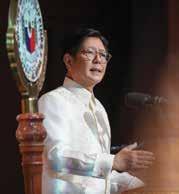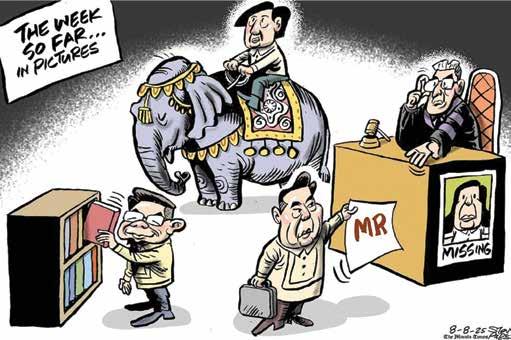




LAS VEGAS – A Las Vegas man who violently attacked his 75-year-old Filipino American neighbor in a racially motivated assault has been sentenced to 90 days in jail and five years of probation, following a plea of guilty but mentally ill.
Christian Lentz, 44, was sentenced on August 4, 2025, by Clark County District Judge Jennifer Schwartz, who also ordered him to enter the Clark County Mental Health Court program. If he violates the terms of his probation, Lentz could face 12 to 30 years in prison.
The attack occurred on May 30, 2023, in the garage of Amadeo Quindara, a retired engineer and longtime resident of the Mountain’s Edge community. Prosecutors said that a day earlier, Lentz had confronted Quindara after hearing him speak Tagalog and told him to “speak English.” The next morning, Lentz returned, entered Quindara’s garage, and repeatedly struck him while shouting “Die, die, die.”
Quindara was knocked unconscious and
u PAGE 3

by AJPress
5, voted to archive the impeachment complaint against Vice President Sara Duterte, formally adhering to a Supreme Court
decision that declared the complaint unconstitutional.
The move effectively ends the high-profile case unless a new complaint is filed after the constitutionally mandated one-year bar lapses on February 6, 2026.
Senator Rodante Marcoleta, who initiated the motion, cited the Supreme Court’s July


by Luisa Cabato Inquirer.net
MANILA — President Ferdinand Marcos Jr. said the government has enough funds to support priority projects of his administration, as long as these funds are not lost to corruption.
He said this in Part 2 of the third episode of the PBBM Podcast, titled “Sa Likod ng SONA,” which aired on
As the DOJ reviews new affidavits in the case, Ang’s camp denies the accusations and maintains his innocence
by AJPress with the workers’ disappearance between April 2021 and January 2022.
25 ruling that the impeachment complaint was void ab initio, or void from the beginning, because it violated the constitutional prohibition on initiating more than one impeachment proceeding against the same official within a 12-month period.
“It says that the complaint was unconstitu-
by HeLen FLores Philstar.com
MANILA — President Marcos has ordered the 60-day suspension of rice importation starting Sept. 1, Malacañang announced on Wednesday, August 6.
The move aims “to protect local farmers reeling from low palay prices during this current harvest season,” Presidential Communications Secretary Dave Gomez said.
Marcos’ directive came after he met with some Cabinet members on Tuesday on the sidelines of his state visit to India, and upon the recommendation of Agriculture Secretary Francisco Tiu Laurel Jr. Gomez and Tiu Laurel are part of Marcos’ delegation in his state visit from Aug. 4 to 8.
Citing reports, the Department of Agriculture (DA) earlier said that with cheaper imports flooding the market, some private traders are u PAGE 4
‘More ICC arrest warrants expected’
by Mark ernest ViLLeza Philstar.com
The complaint includes allegations of multiple murder, serious illegal detention, enforced disappearance, direct bribery, and obstruction of justice. It is supported by sworn affidavits from whistleblower Julie “Dondon”
MANILA – Families of 34 confirmed missing online cockfighting workers (sabungeros) filed a criminal complaint before the Department of Justice (DOJ) on August 1, 2025, naming businessman Charlie “Atong” Ang and several others in connection u PAGE 2
MANILA — Up to three more arrest warrants related to the war on drugs of former president Rodrigo Duterte may be issued by the International Criminal Court (ICC) by the end of this year or early 2026, according to former senator Antonio Trillanes IV.
In an interview with “Storycon” on One News on Tuesday, August 5, Trillanes said efforts are ongoing to expand accountability beyond Duterte.
PAGE 1
tional, is void ab initio,” Marcoleta said.
Minority Leader Sen. Tito Sotto opposed the motion and moved to defer Senate action pending resolution of a motion for reconsideration before the Supreme Court. His motion was rejected by a 19–5 vote.
Shortly after, the Senate voted 19 in favor, 4 against, and 1 abstention to archive the complaint, citing lack of jurisdiction in light of the high court’s ruling.
The Supreme Court's ruling, issued en banc, found that the impeachment complaint was procedurally barred due to an earlier attempt filed within the same one-year period.
The Court emphasized that its decision was based solely on constitutional timing, not the merits of the complaint.
The original complaint alleged culpable violation of the Constitution and betrayal of public trust, citing among others the alleged misuse of confidential funds and controversial remarks made by the vice president about harming public officials. However, the Court ruled that regardless of content, the complaint could not be entertained under the one-year bar rule.
Legal experts said the Senate had no legal recourse but to abide by the high court’s decision.
The decision to archive drew mixed reactions from
the public and political observers. Some viewed it as a necessary act of constitutional compliance, while others lamented the loss of what they considered an opportunity for public accountability.
Vice President Duterte has not issued a formal statement following the Senate action. However, in a filing submitted on June 23, she described the impeachment complaint as “nothing more than a scrap of paper.”
Under Senate rules, archiving a complaint does not equate to dismissal with prejudice. It places the complaint in inactive status unless refiled with new grounds or after the one-year constitutional bar expires. n

“We’re working on that. It won’t happen soon, but it will happen at some point. We’re looking at the end of the year or early next year,” Trillanes said.
Asked how many more officials are being targeted, he said, “At least two, but probably three.”
Vice President Sara Duterte is not among those expected to face ICC charges, Trillanes said.
Roque not leaving The Hague sans Duterte
Meanwhile, the word war between Duterte’s lead counsel Nicholas Kaufman and Harry Roque continues as the former presidential spokesman reiterated that he is not leaving The Hague.
In an interview posted on Facebook, Roque said he does not believe that Duterte wanted him to stop interfering
in the ICC case and just return to the Philippines to sort out his own legal issues, as claimed by Kaufman.
“If Tatay Digong says that face-to-face, I will accept it, but until my two ears hear it directly, I will not leave him. You may need to drag me out of The Hague as I have a promise not only to Tatay Digong, but also to our fellow Filipinos that I will accompany him,” Roque said.
Kaufman has said that Roque approached a Dutch lawyer, who severed communications with Roque upon learning that he was a fugitive from justice.
A trial court in Angeles City had ordered the arrest of Roque and Filipino-Chinese businesswoman Cassandra Ong on charges of qualified trafficking over their alleged involvement in an illegal Philippine offshore gaming operator hub in Pampanga.
PAGE 1
Patidongan and his brothers, who claimed to have worked under Ang’s operations and said they were involved in disposing of victims’ bodies.
Patidongan further alleged that the actual number of victims may reach 100, although only 34 cases have been officially documented. He claimed the victims’ bodies were dumped in Taal Lake, and that he and his brothers were later instructed to flee to Cambodia in 2022 to avoid investigation.
Ang camp responds
In media statements, Ang’s lawyer, Atty. Gabriel Villareal, maintained his client’s innocence, dismissing the complaint as baseless and politically motivated. He described whistleblower Julie “Dondon” Patidongan as a “wolf in sheep’s clothing” and called the testimony “flawed, self-serving, and unsubstantiated.”
“We maintain my client’s innocence. He is ready to face the complaint filed against him and confident that due process will vindicate him.”
Ang’s team also alleged that Patidongan attempted to extort P300 million in exchange for withdrawing the allegations—an offer Ang reportedly declined.
Counter-charges filed
On July 3, 2025, Atong Ang filed counter-complaints with the Mandaluy-

ong City Prosecutor’s Office against whistleblower Julie “Dondon” Patidongan and a former aide, Alan “Brown” Bantiles, accusing them of conspiracy to commit attempted robbery with violence, grave threats, grave coercion, slander, and extortion. These counter-charges were lodged several weeks prior to the DOJ complaint and remain under separate prosecutorial review.
DOJ status and official statement
As of press time, the Department of Justice has not issued subpoenas, and the complaint remains under review by a panel of prosecutors. In a media interview, Justice Secretary Jesus Crispin Remulla confirmed that the affidavits submitted by whistleblowers are
included in the case file. He stated that Charlie “Atong” Ang and Gretchen Barrettoare are among those being evaluated as possible respondents, but clarified that the DOJ would act based on evidence and not on speculation. Remulla emphasized that the department is following due process and said any legal action must proceed “on the merits.”
Broader implications
The case has reignited public attention on one of the Philippines’ most troubling unresolved cases. The disappearance of 34 cockfighting workers between April 2021 and January 2022 led to Senate hearings and prompted then-President Rodrigo Duterte to impose a nationwide ban on online cockfighting (e-sabong) in May 2022.
While internal investigations led to the relief or reassignment of some police officers, no criminal convictions have been made to date.
Family members who filed the complaint expressed determination to pursue the case, saying they hope the legal process will finally bring accountability.
If the DOJ finds probable cause, the case could advance to trial, placing a national spotlight on one of the most closely watched criminal proceedings in recent Philippine history. n
“As the lead counsel, Kaufman has the sole authority on who can be allowed to visit Tatay Digong, and he did not allow me. The ICC wrote me a letter pointing to Kaufman as the reason why I cannot enter his detention cell,” Roque said.
“I promised that I will not leave you. I will be here until the end,” he said, addressing Duterte.
Duterte’s partner Honeylet Avanceña has been barred from visiting him in the ICC detention cell.
Kaufman said Roque has portrayed himself as the only person capable of defending Duterte, turning the public against the Israeli lawyer and his legal team.
According to Kaufman, neither Duterte nor anyone else in “his immediate vicinity is interested in Roque as a lawyer.” (With reports from Bella Cariaso)

by AJPress
As Texas Republicans press ahead with a controversial mid-decade redistricting plan designed to lock in additional GOP seats in Congress, Democratic leaders in the nation’s two largest blue states, California and New York, are threatening to respond in kind.
The growing tension marks an escalation in the partisan redistricting wars, with state leaders proposing bold, if legally fraught, efforts to redraw congressional maps outside the typical once-a-decade timeline. But despite the political rhetoric, both states face steep institutional and legal barriers that make retaliation far easier said than done.
California’s conditional overhaul California Governor Gavin Newsom has publicly backed a plan to override the state’s independent Citizens Redistricting Commission (CCRC) if Texas enacts its new Republican-leaning map. The proposal would allow the Democratic-controlled Legislature to draw a new congressional map, potentially eliminating up to five GOP-held seats in California. The plan is conditional—triggered only if Texas finalizes its partisan redistricting.
Under the proposal, the new map would need to be approved by voters in a special election tentatively scheduled for November 4, 2025. Lawmakers must act by August 22 to place the measure on the ballot, leaving a narrow legislative window when they return from recess on August 18.
But the effort to override the CCRC, which was created through voter-approved reforms (Propositions 11 and 20) to eliminate gerrymandering, has sparked internal dissent and external backlash.
“Gerrymandering, no matter who does it, is wrong,”
said former Governor Arnold Schwarzenegger, a Republican who championed the commission’s creation. “To dismantle an independent commission for political gain would be truly evil.”
Watchdog groups like Common Cause and the League of Women Voters have also criticized the plan, warning it could erode public trust and prompt legal challenges.
Despite support from key Democrats, including Newsom and legislative leaders, some lawmakers have expressed concern about the message this sends to voters. “If we override the commission today, what stops future majorities from doing it again for political gain?”
asked State Senator Dave Cortese (D-San Jose).
New York’s redistricting tensions
New York Governor Kathy Hochul is pursuing a similar course. In recent weeks, Hochul and top Democrats—including Assembly Speaker Carl Heastie—have supported a constitutional amendment that would allow the Legislature to override the state’s Independent Redistricting Commission.
New York’s commission, established in 2014, has been criticized by Democrats as dysfunctional and ineffective. The current congressional map was drawn after courts invalidated the commission’s proposals in 2022. Hochul has framed the push for a new map as a necessary countermeasure.
“The gloves are off,” Hochul said during a press event in Albany. “We cannot unilaterally disarm while other states play by different rules.”
Democratic strategists believe a redrawn map could eliminate several GOP-held seats, including in Long Island and the Hudson Valley. However, the proposal still requires supermajority legislative support and public approval through a constitutional
referendum—hurdles that mirror those in California.
Legal constraints and reform reversals
Both California and New York reformed their redistricting processes in the past two decades, touting them as safeguards against partisan manipulation.
Now, those very reforms stand in the way of mid-cycle map changes. Overturning or circumventing independent commissions would require constitutional amendments, legislative supermajorities, and voter approval—each a politically sensitive step.
Reform advocates warn that Democrats risk undermining their credibility on issues like good governance and electoral fairness.
“This is about power, not principle,” said Kathay Feng, national redistricting director at Common Cause. “If Democrats abandon reforms to gain seats, they’re no better than the gerrymanders they once condemned.”
Legal experts also note that courts could intervene. Lawsuits would likely be filed immediately if either state attempts a mid-decade redistricting without meeting constitutional requirements.
National implications
The redistricting clash between Texas, California, and New York could reshape the political landscape ahead of the 2026 midterm elections, especially in the narrowly divided U.S. House of Representatives. Texas’s plan alone could shift four to five seats toward Republicans, and Democrats in blue states argue they must act to preserve electoral balance.
But the high-profile pushback has also fueled warnings about a growing “arms race” in gerrymandering, with each side using state power to tilt the national map in its favor.
“Two can play at this game,” said one California legislative staffer. “But we may end up losing the rulebook entirely.”
PAGE 1
sustained serious injuries, including a brain bleed, memory loss, and facial trauma. His wife discovered him on the garage floor and called emergency responders. Lentz was arrested shortly after.
He was charged with multiple felonies, including burglary and battery with substantial bodily harm to a person over 60. Prosecutors also filed a hate crime enhancement under Nevada Revised Statutes §193.1675, citing clear evidence of racial bias.
In April 2025, Lentz entered a guilty but mentally ill plea, acknowledging re-
sponsibility for the attack while citing a mental health diagnosis of bipolar disorder with psychotic features. The plea allowed for psychiatric monitoring under court supervision but did not excuse the conduct.
Judge Schwartz also ordered $7,000 in restitution to be paid to the Quindara family. During sentencing, she stated, “There is no place for hate here in Nevada,” underscoring the seriousness of bias-motivated crimes.
Phil Quindara, the victim’s son, told reporters after the hearing that while the family was relieved to see the case move forward, the sentence
was “devastating.”
“This tells me that justice is not for people who look like my dad,” he said, adding that the outcome failed to reflect the severity of the assault or its emotional toll on the family.
The case has drawn condemnation from Filipino American and AAPI advocacy groups, who have long called for stronger enforcement of hate crime laws and more protections for Asian American seniors.
The Quindaras say they are speaking out to raise awareness and help protect other families from similar attacks.
(AJPress)
PAGE 1
Wednesday, August 6.
In the podcast, Marcos was asked whether the Philippines has sufficient funds to sustain projects he mentioned in his recent State of the Nation Address (SONA), to which he responded in the affirmative.
“Yes, there is. As long as the money of the Philippines
is used properly. The money allocated for this – for classrooms – is actually used for classrooms,” Marcos said.
“It didn’t say two classrooms, but only one was built. The rest was pocketed. Things like that,” he continued.
Marcos then stressed, “‘If we’re really strict and our funds are used properly,
then we have.”
In his Sona last July 28, the President laid out several priority programs for education, health, infrastructure, and other sectors.
These include the ongoing P20/kilo rice program, zero-balance billing for patients at Department of Health-listed hospitals, Bulilit Centers, and more. n

now buying palay (unmilled rice) for as low as P8 to P10 per kilo, well below the production cost of P12 to P14 per kilo.
Farmers have attributed this sharp decline to the influx of cheaper imported rice, the DA noted.
Higher rice tariff not discussed
Meanwhile, Gomez said the proposal to increase the imported rice tariff was not tackled during the meeting.
“The president said it is not yet time to discuss tariff increases on imported rice,” Gomez said.
“We will still see if we need to resort to that. Right now, the decision is to suspend all rice importation for 60 days beginning Sept. 1. That’s the directive of the president to help our rice farmers,” he added.
Tiu Laurel earlier said the DA would push to increase the current 15 percent tariff on imported rice during the third periodic review.
He said a tariff increase would help lift prevailing palay farmgate prices, especially since the next harvest season is a few months away. Several industry groups have pushed to revert the rice tariff to its original rate of 35 percent to drive up palay farmgate prices.
Tiu Laurel said the DA supports a gradual increase in the rice tariff rate to prevent possible market shocks.
Based on Philippine Statistics Authority data, the average farmgate price of palay in June declined by almost 32 percent year-on-year to P16.99 per kilo from P24.93 per kilo. Tiu Laurel had suggested that the tariff hike should coincide with the harvest seasons of the Philippines’ major suppliers – around late September for Vietnam and December for Pakistan – to minimize impact on the local market.
Last year, Marcos issued Executive Order 62, which lowered the imported rice tariff from 35 to 15 percent until 2028 to tame rising prices of the commodity.
The government mandated a periodic review of the rice tariff every four months.
Meanwhile, Malacañang disagreed with the joint resolution filed by Senators Francis Pangilinan and Risa Hontiveros seeking to strip the President of powers to adjust imported rice tariffs.
At a press conference in India on Tuesday, August 5, Presidential Communications Undersecretary Claire Castro said removing the president’s
power to adjust rice tariffs could affect the government’s ability to respond quickly during a price surge or in emergencies.
Castro also defended Marcos’ move to lower tariffs on imported rice, saying it was a necessary step to provide relief to consumers when global prices hit $700 per metric ton.
“I don’t think lawmakers will be able to negotiate with other countries,” she said.
House backs move
The House of Representatives yesterday expressed its full support for the president’s directive to suspend rice importation.
“This is the reason why our House Bill No. 1 is the RICE Act, right? Because it is important to address the issue of making sure there is affordable, accessible rice for Filipino families and to continue to protect farmers,” House spokesperson Princess Abante said, referring to the proposed Rice Industry and Consumer Empowerment Act.
Filed by Speaker Martin Romualdez on the opening day of the 20th Congress, the proposed RICE Act seeks to return the National Food Authority’s regulatory powers and stabilize rice supply, lower market prices and protect Filipino farmers from exploitation.
Romualdez said suspending rice importation is a bold step to protect farmers and put the people’s food first.
“Every harvest season, farmers watch the market collapse under the weight of imported rice. This suspension gives us a chance to breathe, reset and act decisively,” he said.
Albay Rep. Raymond Adrian Salceda also supported the president’s directive, saying “it is the right call to protect Filipino farmers who are harvesting now and deserve a fair price for their produce.”
“This is the season when our farmers try to recover their costs and earn enough to survive. We owe them this protection,” he added.
‘Superficial move’
Suspending rice imports is a superficial move that does not address the root causes of the country’s rice crisis, according to farmers’ groups Kilusang Magbubukid ng Pilipinas (KMP) and Samahang Industriya ng Agrikultura (Sinag).
Republic Act 11203 or the Rice Liberalization Law that the Marcos administration continues to uphold remains the primary cause of declining farmgate prices and increasing rice costs, KMP chairman Danilo Ramos said.
Reverting tariffs to 35 per-
cent for imports from the Association of Southeast Asian Nations and to 50 percent for non-ASEAN imports is needed to stabilize local farmgate prices, Sinag executive director Jayson Cainglet said.
Harvest starts
In Nueva Ecija, palay farmers have started harvesting rice crops for the main cropping season amid the rising farmgate prices of palay.
Palay trader Rolly dela Cruz from San Miguel, Bulacan told The STAR that farmers welcomed developments in palay prices following low commodity prices in the past months.
Fresh farmgate palay prices slightly increased between P13 and P14 per kilo compared to the P8 to P10 per kilo a few weeks back, he noted.
If imported rice tariffs are reverted to 35 percent, the farmgate price of fresh palay would stabilize at P17 to P18 per kilo, much to the advantage of local farmers, Sinag president Rosendo So said.
The spike in farmgate palay prices could be attributed to the possible reversal of tariff cuts and temporary halting of rice importation during the main rice crop harvest season, Federation of Free Farmers Cooperative national manager Raul Montemayor said.
P20/kilo rice
Meanwhile, Marcos said subsidies for the P20-perkilo rice program would be reduced if rice production is enhanced.
The president has allocated P4.5 billion from his contingency fund to bankroll the pilot implementation of the program.
“It should come. While our production improves, it (subsidy) will go down. We have reached the point where we can say that we can afford it. We can afford the subsidy,” Marcos said. “As the subsidy becomes less and less, the coverage of the P20 rice will be wider.”
The P20-per-kilo rice program was launched in April for low-income households.
The cost of subsidizing the cheap rice is shared by the national and local governments.
Marcos said the Philippines has experienced a significant bumper crop production in the last planting seasons due to reforms, such as the campaign against smuggling and hoarding, distribution of farm machineries and giving of land ownership certificates to agrarian reform beneficiaries. (With reports from Ramon Efren Lazaro, Jose Rodel Clapano, Christine Boton, Delon Porcalla, Alexis Romero)

AGAP Rep. Nicanor Briones was removed from a key post after being caught watching e-sabong.
APEC Rep. Sergio Dagooc was seen watching billiards but faces no confirmed investigation
MANILA — The 20th Congress opened amid controversy after two lawmakers were caught on camera watching videos on their smartphones during the July 28 plenary session, just hours before President Ferdinand Marcos Jr. delivered his fourth State of the Nation Address (SONA).
AGAP Party-list Representative Nicanor Briones was shown in a viral video watching an online cockfighting (e-sabong) match while seated inside the House plenary hall. He later admitted to being the individual in the footage, but denied participating in any form of online gambling. Briones said he received the video link from a relative and viewed it out of curiosity. He stressed that he does not own an e-wallet and is not involved in e-sabong.
Despite his explanation, Briones was removed from his post in the powerful
Commission on Appointments (CA), with House leaders citing the need to uphold institutional integrity. He is now under review by the House Committee on Ethics, which has not yet announced whether formal sanctions will follow.
A second lawmaker was also seen watching a billiards match on his phone during the same session. As of August 6, multiple reputable outlets —including The Philippine STAR and Politiko.com.ph— have reported that the second lawmaker was APEC Party-list Representative Sergio Dagooc. While Dagooc has not publicly addressed the incident, his office has not denied his involvement. However, there is no public confirmation at this time that Rep. Dagooc is facing an ethics review or formal disciplinary action. The videos were recorded during the vote for House Speaker—a largely ceremonial proceeding that took place prior to President Marcos Jr.’s national address.
Nonetheless, the behavior sparked widespread criticism and renewed calls for stricter rules on the use of mobile devices during legislative sessions.
Senator Erwin Tulfo condemned the actions and called for public accountability. “There must be accountability, especially when public officials are entrusted with the people’s time and trust,” Tulfo said.
The controversy has also reignited public outrage over e-sabong, particularly in light of the still-unresolved disappearances of more than 30 cockfighting enthusiasts (“sabungeros”) since 2021. President Marcos addressed the issue during his SONA, vowing justice and accountability in the ongoing investigations.
As of this writing, neither Briones nor Dagooc has issued a public apology beyond Briones' initial statement. The House Ethics Committee has yet to announce the outcome of its inquiry into Briones’s case. n


a leader’s true measure is the test of time
THE opening of the 20th Congress, followed by President Ferdinand Marcos Jr.’s recent State of the Nation Address, offers more than a window into legislative priorities or political optics. These moments compel a deeper reckoning, not just with the state of the nation but with the very nature of leadership itself.
The Philippines is navigating a delicate intersection of history and ambition. Our democracy, restored and revised yet still vulnerable, continues to carry the burden of its past while straining toward a future that remains undefined. In this environment, genuine leadership cannot be measured by popularity, policy soundbites, or the lifespan of a single term. It must be weighed against time itself.
True leadership is not confined to calendars or campaign cycles. It is rooted in stewardship: grounded in history, responsive to the present, and responsible to the future.
RIchaRd heydaRIan Horizons
There is a reason why ancient philosophers were profoundly skeptical about democracy. In “The Republic,” Plato described democracy as “a charming form of government, full of variety and disorder, and dispensing a sort of equality to equals and unequals alike.” Witnessing the tragic demise of his mentor, Socrates, at the hands of demagogues, Plato was alert
The most consequential leaders throughout history did not govern with the sole intention of preserving power. They governed to pass something on.
Singapore’s Lee Kuan Yew, South Korea’s post-dictatorship reformers, and U.S. President Lyndon Johnson each confronted the uncomfortable truth that real progress often demands personal sacrifice. They governed with the understanding that the most enduring transformations are rarely popular in the moment and that statesmanship sometimes requires walking alone.
Lee Kuan Yew did not simply modernize

Singapore. He engineered a national identity built on meritocracy, discipline, and longrange planning. In the 1960s, as post-co-
lonial states faltered under corruption and factionalism, Lee made decisions that were
to the tendency of majoritarian democracies to descend into demagogic frenzy. While aware of the halcyon days of Athenian democracy, when grand statesmen like Pericles inspired political grandeur, he was also acutely alarmed by the tendency of even promising democracies to undergo political degeneration. Superstition, populist antics, and au-

thoritarian tendencies always threatened to poison even the most promising democracies.
Plato’s protégé, Aristotle, was even more critical, dismissing democracy as “analogous to tyranny, where law has ceased to be sovereign and the notion of a constitution has practically disappeared.” For Aristotle, democracy is “a con-
Last week, my family and I left the Philippines for a vacation in Japan.
We slogged through our departure amid disarray and disaster. The traffic was awful. Paying for tolls was infuriating, as some people tried to cut into already-long lines. The airport driveway was slippery from the leaking shades overhead. Flights were delayed because of staff short-
ages. The news on our phones kept replaying scenes of different cities and towns across the Philippines crippled by floods, and, much later, scenes of a government crippled by technicalities.
When we arrived in Tokyo, we got gracious assistance at every turn. Even when queuing in long lines, people were patient. Things didn’t change in Sapporo: people were helpful, sometimes apologetic, but not oversolicitous or annoying. If they didn’t know English, they took out their phones and called on the pow-
ers of Google Translate. When I trotted out my beginner Nihongo, they giggled, answered in both Nihongo and halting English, and beamed when I attempted to carry out whatever conversation I could. They set aside tasks to help and explained their answers, even if it took time, even if they had to revert to full Nihongo and interpretative dance, so that I had to go with context clues.
This was something we’ve always observed in Japan, even in cities with divergent
give rise to any litigation.
Publication of a Client’s Material does not constitute an a greement to continue publication.
Client agrees and covenants to indemnify AJPI and its officers against any and all loss, liability, damage, expenses, cost, charges, claims, actions, causes of action, recoveries, judgments, penalties, including outside attorneys’ fees (individually and collectively “Claims”) which AJPI may suffer by reason of (1) Client’s breach of any of the representations, warranties and agreements herein or (2) any Claims by any third party relating
politically unpopular but strategically necessary. He prioritized competence over charisma, constrained certain freedoms to build lasting institutions, and embedded technocratic governance into the civic DNA. His methods may remain contested, but the durability of what he built continues to define Singapore’s success to this day.
In South Korea, the architects of democratic transition in the late 1980s emerged from decades of authoritarian rule with the opportunity to shape the state in their own image. They chose instead to embed limits on their own power. Through constitutional checks and institutional safeguards, they deliberately created a system resilient enough to endure political volatility, public dissent, and the forces of populism. Their reforms were not only democratic in form, but self-restraining in principle.
Lyndon B. Johnson, in the United States, signed the Civil Rights Act of 1964 and the Voting Rights Act of 1965 knowing the political cost. He understood that championing racial justice would fracture his party’s support in the American South for a generation. Yet he proceeded, not for the sake of political gain but for a moral imperative. His presidency was irrevocably changed, but so too was the nation. That trade, painful as it was, became the mark of
his statesmanship. What unites these leaders is not ideology, geography, or method. It is vision. They recognized that applause is fleeting while durable change, rooted in principle, requires endurance. They governed not for approval, but for alignment with a larger national purpose. Their leadership was never about being remembered fondly; it was about ensuring their countries remembered themselves rightly.
This is the kind of leadership the Philippines urgently needs. Not governance focused solely on metrics or optics, but leadership that embraces nation-building as an intergenerational responsibility.
The current administration’s efforts to expand infrastructure, accelerate digital transformation, and attract foreign investment are not without merit. If institutionalized and implemented with continuity, these initiatives have the potential to reshape the Philippine economy and its place in the region. But success will not be determined by project launches or ribbon cuttings. It will depend on whether the systems behind them are built to last and to serve citizens regardless of who occupies Malacañang.
Congress must rise to the same challenge. Its role is not simply to pass laws or assert party loyalty. The 20th Congress inherits the responsibility to build frameworks that protect long-term
national interests - education policy that readies the next generation, climate measures that preserve the archipelago, fiscal policies that resist short-term populism in favor of long-term solvency.
A republic is not secured by a single term in office. It is fortified by the accumulation of decisions made with foresight and humility. Democratic leadership is often quiet, even thankless. But it is this quiet labor that protects the soul of a nation.
In Filipino, we call this paninindigan: the act of standing firm, even when it is difficult or inconvenient. It is this kind of character that must guide the leaders of today. Not a pursuit of personal legacy, but a commitment to shaping institutions that will outlast them.
We must remember that nations are not built in sixyear increments. They are shaped across generations through deliberate, principled action. The work of governance is not only to respond to the present but to prepare for a future we may never see.
Let this be the moment when our leaders embrace that responsibility. Let public office become a platform for legacy, not a stepping stone for power. Let governance be defined by the strength of vision, not the brevity of tenure.
History will not remember how loudly one ruled. It will remember how long the nation endured because of how wisely it was led. (AJPress)

PAGE 6
temperaments. In Tokyo, with its loud structures and quieter residents, as in Sapporo, with its smaller environs and bustling citizens, there were people willing to help, or people telling others to be quiet so that people wouldn’t be bothered by the noise.
People weren’t just polite. They were considerate.
Yes, we haven’t ever lived in Japan, so we don’t know its flaws or see the inconveniences of everyday life. Yet we’ve always heard ourselves being compared with the Japanese, to the point that people ask why we aren’t as disciplined or as innovative, to the point that people think that simply making our rules stricter will make Filipinos more obedient.
The discipline the Japanese
PAGE 6
exercise, however, is woven into their everyday lives and could stem from how they view themselves in relation to others. The innovation they possess isn’t just something built by funding, but something that seems to come from childhood.
This was most apparent when we visited Sapporo’s newly built AOAO aquarium, which was inside a mall that featured a lot of amenities: a playroom for arts and crafts, bookshelves and reading nooks built next to smaller aquariums, and even a café where people could watch rockhopper penguins while eating a croissant or sipping coffee.
The children weren’t screaming or showing off. The books were well maintained.
The whole place was clean even if people could bring in their food. There were maintenance personnel and few trash bins, but people didn’t leave their trash to be picked up. Their cleanliness wasn’t born of fear, but a consideration for others (perhaps a habit?).
The children were curious as well. They pointed at animals, asked their parents questions, smiled as they received answers.
And their parents? Engaged, with no baby talk, reading the aquarium descriptions to their children and showing their own sense of wonder. There were fewer people taking photos than parents reading to their children.
We often say we have to change our culture, but there
stitution in which the free-born and poor, being the majority, control the government.”
But Aristotle was no fan of oligarchy either, lamenting a system in which “the rich and better-born, being the minority, control the government.” While Plato preferred a proto-socialist system under the thumb of a “philosopher king,” Aristotle believed in a “mixed system” whereby the best elements of aristocracy, monarchy, and majoritarian rule create a stable and inclusive political system.
Our political system represents the worst combination of what Aristotle understood as “oligarchy” and “democracy.”
Instead of getting a “philosopher king,” as in Singapore’s Lee Kuan Yew, we have steadily descended into a kakistocracy, whereby feckless demagogues, grifters, and craven sophists have come to dominate the ostensibly “democratic” landscape. Meanwhile, a tiny minority controls the commanding heights of the economy. At the height of political reformism under former president Benigno Aquino, the 40 richest families on the Forbes wealth list swallowed up 76 percent of the country’s gross domestic product growth. That is twice as bad as in Thailand and more than 10 times worse than in neighboring Malaysia. The same period also saw political dynasties controlling up to eight out of 10 elected offices. The entry of the “Dutertegarchs” under the former president has only worsened this dynamic.
The back-to-back victory of
the Dutertes and Marcoses was the most explicit rejection of supine reformism that replaced the dictatorship. While emotionally understandable, the “protest votes” in 2016 and 2022 were a classic “out of the frying pan [and] into the fire” situation. With liberal-reformist forces largely marginalized despite iconic wins in the latest elections, we have ended up with a vicious showdown between two powerful dynasties.
The recent Supreme Court decision was no surprise to me. Nor was the spirited critique of it by legal luminaries from across the political spectrum. And while it’s true that the majority of our Supreme Court justices were appointed by the former president, it’s unfair to make any automatic inferences about their decision-making. Having heard basically all sides of the debate on the Sara impeachment issue, including senior statesmen from all three branches of the state, it’s clear to me that blaming a single individual or institution for our current predicament misses the point. It also risks alienating potential allies for genuine transformation down the road.
The back-to-back victory of the Dutertes and Marcoses was the most explicit rejection of supine reformism that replaced the dictatorship. While emotionally understandable, the “protest votes” in 2016 and 2022 were a classic “out of the frying pan [and] into the fire” situation. With liberal-reformist forces largely marginalized despite iconic wins in the latest elections, we have ended
up with a vicious showdown between two powerful dynasties.
The recent Supreme Court decision was no surprise to me. Nor was the spirited critique of it by legal luminaries from across the political spectrum. And while it’s true that the majority of our Supreme Court justices were appointed by the former president, it’s unfair to make any automatic inferences about their decision-making. Having heard basically all sides of the debate on the Sara impeachment issue, including senior statesmen from all three branches of the state, it’s clear to me that blaming a single individual or institution for our current predicament misses the point. It also risks alienating potential allies for genuine transformation down the road.
Don’t take our democratic politics for granted. In a Pew Research Center survey, as many as half of Filipinos favored autocratic rule if it meant a more responsive political system. Unless our political elite gets its act together, we risk strengthening extremist “revolutionary government” voices as well as making our beloved country more vulnerable to the machinations of foreign powers. The political center is barely holding, and we may soon be peering into the abyss. (Inquirer.net) *
The opinions, beliefs and viewpoints expressed by the author do not necessarily reflect the opinions, beliefs and viewpoints of the Asian Journal, its management, editorial board and staff.
rheydarian@inquirer.com.ph
The Commission on Filipinos Overseas enhances programs like Balinkbayan and PESO Sense, partnering with the Philippine Stock Exchange and Go Negosyo to empower overseas Filipinos in investment, entrepreneurship, and financial literacy aligned with the president’s development agenda
MANILA — The Commission on Filipinos Overseas (CFO) is stepping up efforts to engage Filipinos living abroad as investors and partners in national development, following President Ferdinand “Bongbong” Marcos Jr.’s recent call to the international business community during his State of the Nation Address (SONA).
“My single resounding message to the international business community is this: The Philippines is ready. Invest in the Filipino…” said President Marcos.
CFO Secretary Dante “Klink” Ang II said the agency fully supports this call and has long worked to connect overseas Filipinos with investment opportunities through its programs.
“We fully support the president’s call to the international community to invest in the Philippines. This perfectly aligns with CFO’s efforts of reintegrating the Filipino diaspora through investment opportunities in our country,” Ang said.
The CFO continues to develop Balinkbayan, an online portal that connects overseas Filipinos to business and donation opportunities in the Philippines.
In partnership with the Philippine Stock Exchange, the CFO advocates for global Filipinos to become long-term investors in Philippine-listed companies.
The Commission also expands its financial literacy campaign, PESO Sense, which offers webinars, digital
campaigns, and tools promoting responsible budgeting, saving, investing, and scam awareness among overseas Filipinos and their families.
To promote entrepreneurship among Filipinos abroad, the CFO partners with Go Negosyo, supporting returning Filipinos’ economic reintegration and countryside development.
In a post-SONA discussion, Special Assistant to the President for Investment and Economic Affairs, Secretary Frederick D. Go, emphasized the importance of attracting investments to generate employment for Filipinos.
“The president’s message to investors is a big deal; it not only signals to investors the improved business environ-
PAGE 9

by DoMinique niCoLe FLores Philstar.com
MANILA — The House didn't hear the end of it when senators who voted in favor of archiving Vice President Sara Duterte's impeachment explained their vote with a special message to the lower chamber.
high court itself," he said on Wednesday, August 6.
adopting the complaint in the plenary.
By delaying the convening of an impeachment court to the last session day on June 11, and choosing not to act during the break, Escudero said the Senate became a target of House attempts to erode public trust.


Senate President Chiz Escudero, in his 22-minute speech, doubled down on his opposition to Duterte’s impeachment and issued a stern warning to the House of Representatives, accusing it of abusing its discretion in the accountability process.
"To the House of Representatives, I say, do not allow yourselves to be used for the blind hatred and ambition of a few who did things haphazardly, gravely abused their discretion, and violated due process rights under the Constitution as found by the
Escudero took another swipe at the House, saying it expected the Senate and the Supreme Court “to roll over in obedience” in heeding its call to proceed with the impeachment trial. He even posed questions to critics, asking whether they are "truly for accountability or simply anti-Duterte?"
"Do you truly respect and want to preserve the Constitution or you simply hate the VP? Are you serving the nation's interests or protecting and pursuing your own personal ambitions or agenda?" Escudero asked.
The House impeached Duterte when 215 House members endorsed the fourth complaint on February 5, immediately transmitting the articles of impeachment to the Senate moments after
"When we did not, you moved hell and high water to destroy personalities, malign reputations, and tarnish institutions. To these people, I say this, the Senate is not your playground to run after your political enemies," Escudero said.
The House leadership didn't take these accusations without a fight, reaffirming the constitutionality of Duterte's impeachment and dismissing the claims made against them.
From the filing of the
PAGE 7
isn’t a standard definition of what a culture is. Cultures are always in flux: as people shift residences, change their beliefs, reexamine their values, or raise their children in ways distinct from their own, so are they participating in and reconstructing culture.
Perhaps what we mean is that we need incremental, consistent change in habits.
A big step: stop dismissing children’s questions and allow people to question authority. Engage others in conversation. Listen. Let children be curious and eventually learn to think critically. Reward critical thinking that allows children to improve their lives and innovate, rather than cookie-cutter projects that fulfill
template criteria.
Then maybe we’ll have kids who grow up curious and considerate, who want people around them to feel loved and welcomed so that their convenience doesn’t come at the price of someone else’s dignity.
Maybe we’ll have people who don’t label themselves “resilient” all because they put up with haphazard urban planning and incompetent leaders. Maybe we’ll have people who speak up because they see wrongdoing, who will protest when they see corruption, who will raise hell when technicalities stand in the way of justice.
Maybe we’ll have people who value actual leadership over entertainment. Maybe
we’ll have people who vote for servant-leaders rather than lame ducks or thieves who stand as symbols of wannabe dynasties.
Overhauling a culture doesn’t mean telling people to shut up and obey, or just deal with their suffering. That’s not instilling discipline. That’s oppression.
We don’t have to be like the Japanese, or the Singaporeans, or whoever.
We just have to be better Filipinos. (Inquirer.net)
* * *
The opinions, beliefs and viewpoints expressed by the author do not necessarily reflect the opinions, beliefs and viewpoints of the Asian Journal, its management, editorial board and staff. *
iponcedeleon@ateneo.edu
ment in the country, but it also promotes our workforce for better employment opportunities,” Go said.
Secretary Ang echoed these remarks, highlighting the Filipino diaspora’s readiness to engage in business and investment.
“We have been echoing the president’s statements for a
while now. Indeed the Filipino people are ready to do business. This is why at the heart of CFO’s projects and initiatives is the engagement of the Filipino diaspora through entrepreneurial and investment opportunities,” Ang said.
The CFO, established under Batas Pambansa Blg. 79, serves Filipinos permanently residing abroad, distinct from
the Department of Migrant Workers which focuses on Overseas Filipino Workers. For more information: CFO Balinkbayan: https:// www.facebook.com/cfobalinkbayan PESO Sense: https://www. facebook.com/pesosenseph Contact: info@cfo.gov. ph | rkperalta@cfo.gov.ph | +63 960 579 0. n

by riC sapnu, eJ MaCababbaD Philstar.com
MANILA — After receiving P30 million allegedly in exchange for the release of a business permit, the National Bureau of Investigation (NBI) arrested Mayor Abundio Punsalan Jr. of San Simon, Pampanga and accomplice Ed Ryan Dimla in Angeles City on Tuesday, August 5.
The amount was the initial payment for P80 million that the suspects allegedly demanded from complainant Realsteel Corp. before the town government would issue the business permit.
Realsteel claimed that the suspects demanded payment in tranches for the remaining P50 million.
Aside from catching the two red-handed, NBI operatives also disarmed several of the mayor’s security escorts during the payoff in a restaurant at Clark Freeport Zone.
Punsalan, now in his last term, has been suspended four times since taking office in 2019.

The first three suspensions were ordered by former Pampanga governor Dennis Pineda and the provincial board over a questionable land deal near San Simon municipal hall.
Despite the controversies, Punsalan still won reelection although by a narrow margin last May, defeating his closest opponent by 533 votes.
The suspects, who are now detained at the NBI headquarters in Manila, underwent inquest proceedings yesterday on charges of violating the Anti-Graft and Corrupt Practices Act. n
The fourth suspension, ordered under Administrative Case 01-2024 in June 2024, stemmed from Punsalan’s issuance of a mayor’s permit to One Sky Aluminum Extrusion, which allegedly operated without an environmental clearance certificate.


by AJPress
MANILA – President Ferdinand R. Marcos Jr. has signed into law Republic Act No. 12231, or the Government Optimization Act, which grants him the authority to restructure executive agencies to improve the delivery of public services.
Signed on August 4, 2025, and published the same day on the Official Gazette website, the new law enables the president to reorganize, consolidate, transfer, merge, or abolish certain agencies, offices, and government-owned or controlled corporations (GOCCs) within the Executive Branch—excluding those already covered under RA 10149.
The law empowers the President to initiate reforms across the bureaucracy over a fiveyear period, beginning upon the measure’s effectivity. The primary aim, according to lawmakers and the Department of Budget and Management (DBM), is to eliminate redundancy, align agency mandates, and enhance responsiveness in the national government’s operations.
“This law reflects our commitment to create a more agile, responsive, and accountable government that is fit for purpose,” said Budget Secretary Amenah Pangandaman, who lauded the bill’s passage in a June statement.
Oversight through COEB
Under the measure, a Committee on Optimizing the Ex-
ecutive Branch (COEB) will be created to oversee implementation. The committee will be chaired by the Executive Secretary and co-chaired by the Budget Secretary, with members including heads of the Civil Service Commission (CSC), the National Economic and Development Authority (NEDA), the Anti-Red Tape Authority (ARTA), and the Presidential Management Staff (PMS).
This body will conduct strategic institutional reviews and propose restructuring plans based on performance, relevance, and alignment with national development priorities.
Exemptions and safeguards
The law exempts the following sectors from coverage:
• Teaching and non-teaching positions in the Department of Education and state universities and colleges,
• Military and uniformed personnel
• The judiciary, legislature, constitutional commissions, and the Office of the Ombudsman—although these constitutional bodies may adopt the law voluntarily.
To ensure a humane transition, the law provides protection for affected government employees. Options such as reemployment, transfer, reskilling, early retirement, or separation with benefits are available under Sections 13 to 17 of the Act.
Legislative support
RA 12231 evolved from the long-deliberated Rightsiz-
complaint to including it in the Order of Business, Speaker Martin Romualdez maintained they had followed every rule in the book.
"[W]e have been met with personal attacks, sweeping accusations, and a narrative that seeks to reduce a solemn constitutional duty into mere power play. That's not just unfair — it's dangerous. It undermines public trust in the very tools of democratic checks and balances," he said. 'Speaker didn't act alone' Its leaders and deputy speakers were quick to back up Romualdez against claims of abuse of discretion and political ambition raised by senators who sided with the Supreme Court's ruling. They urged the Senate not to "twist the narrative" when the House "did its job."
and loved by the people, why not replace the one who was chosen only by you?)
"Ano kaya kung 'yung Speaker niyo nalang ang palita niyo?" Marcos suggested, encouraging the lower chamber of being capable to do so.
(How about replacing your Speaker instead?)
House Deputy Majority Leader Zia Alonto Adiong described Marcos' suggestion to replace the speaker as "unwarranted, undemocratic and unwise."
With 2028 elections in mind
unanswered
If the Senate is serious about holding public officials accountable, Khonghun said it should focus on the unresolved issues surrounding the vice president’s confidential funds and the bribery allegations.
Senior Deputy Speaker Jay-Jay Suarez also said that the Senate's archiving of the impeachment is simply a "deflection from the real issues raised in the impeachment case."
ing the National Government Act, a priority bill endorsed by the Legislative-Executive Development Advisory Council (LEDAC). It was ratified by both the Senate and the House of Representatives in June 2025, following unanimous approval in the upper chamber.
In welcoming the ratification, Secretary Pangandaman emphasized that the law is a long-overdue reform that will optimize the use of public resources and improve bureaucratic performance.
“Our current structure, in many parts, is bloated or misaligned,” she said. “Some offices perform overlapping functions, while others are underutilized. This law helps us correct that.”
Implementation timeline
As per standard legal practice in the Philippines, RA 12231 will take effect 15 days after its publication in the Official Gazette or a newspaper of general circulation. Implementation guidelines are expected to be issued by the DBM and the COEB in the coming months.
Local government units (LGUs) may choose to adopt optimization measures based on their fiscal capacity, and subject to national guidelines.
While implementation details are still forthcoming, public sector unions and watchdog groups are expected to monitor how the law is applied, particularly with regard to job security, transparency, and service impact. n
"Kung may dapat magpaliwanag ngayon, hindi ang Kamara kundi ang Senado. You can’t defend one branch of government by attacking another," Rep. Jude Acidre (Tingog Partylist) said in a statement on Thursday, August 7.
He argued the Senate owes the public more than just the justification that it followed the Supreme Court’s ruling in its 19-4-1 vote to shelve the impeachment, considering that the decision is still being appealed.
"When over 200 members vote in favor of impeachment, that’s not just one man’s decision. That’s the House speaking as an institution. Calling it a political maneuver is not only unfair, napakamisleading nito," Acidre said.
Replace the speaker? Sen. Imee Marcos, the very cousin of Romualdez, was more direct in criticizing the House, claiming that the push to proceed with Duterte’s impeachment was influenced by political interests to eliminate her from the 2028 national race.
"Sa mga mahal kong kongresista, may suggestion po ako. Suggestion lang naman. Huwag niyong masamain. Kaysa inaatupag niyong palitan ang pinili ng taumbayan, ibinoto at minahal, bakit di niyo na lang palitan ang tao na kayo lang naman ang pumili?" she asked.
(To my dear fellow congressmen, I have a suggestion. It’s just a suggestion, so please don’t take it the wrong way. Instead of focusing on replacing someone chosen, voted for,
Marcos wasn't the only senator who explained their vote with the 2028 elections in mind. Sen. Alan Peter Cayetano, who said that while the Senate is all for accountability, he believes the Supreme Court is right: “Sa tamang panahon, tamang proseso.” (At the right time, right process.)
"Dapat may impeachment, pero hindi dapat gamitin ito nang magkalaban lang sa pulitika. Ayaw natin maging presidente si Vice President Sara, talunin niyo nalang sa 2028. Ngayon, kung talagang may ginawa siyang masama, edi i-impeach pero sa tamang paraan," Cayetano said when he explained his vote.
(There should be an impeachment, but it shouldn't be used just because political rivals are at odds. We don't want Vice President Sara to become president, then just beat her in 2028. Now, if she really did something wrong, then go ahead and impeach her, but do it the right way.)
Acidre, however, disagreed with Marcos' and Cayetano's assumption, denying the impeachment had anything to do with the 2028 elections.
"Nag-umpisa ito dahil may tanong ang taumbayan. (This started because the people had questions.) ... Let's not insult the intelligence of our people," he added.
Deputy Speaker Jay Khonghun also came to Romualdez’s defense, criticizing some senators for their remarks, which he said lacked restraint and risked undermining the integrity of the institution.
“What was said was not just a personal opinion. It became a public provocation. And when a senator calls for the ouster of the House Speaker, that’s not just political noise anymore, it becomes borderline interference,” he said in a statement.
Corruption claims
"Maybe the better question is: Why is the Senate avoiding accountability? Why archive a complaint when the Supreme Court hasn’t even ruled with finality yet?" Adiong asked.
Rep. Joel Chua (Manila, 3rd District), who chairs the House good government panel that led the investigation, added that these could have been addressed had the Senate allowed the prosecution panel to present its evidence and the articles of impeachment, instead of shelving the case after raising more questions than answers.
"At tinatanong ng taumbayan kung nasaan napunta ang higit kalahating bilyong piso na nawawala po. Tinatanong din po ng taumbayan kung nasaan at kung sino si Mary Grace Piattos," he said, referring to the alleged misuse of confidential funds and its questionable recipients.
(And the public is asking where the more than half a billion pesos that went missing went. They're also asking where and who Mary Grace Piattos is.)
He added that the allegations that Duterte faces in her impeachment won't be resolved by attacking Romualdez because the bigger picture in this case is accountability.
"Ngayon ang tanong ko po, ano po ba ang iniiwasan at pinoprotektahan nila?" Chua asked. (Now my question is, what are they trying to avoid and protect?)
While some may view the Senate’s decision to archive the impeachment as its conclusion, Suarez pointed out that it "does not erase the people’s demand for answers."
The Senate may have archived the impeachment, but the Supreme Court has yet to decide on the motion for reconsideration filed by the House before Duterte's impeachment could be considered officially dead. n
The Fil-Am community gets more immigration questions answered in part 2 of the Filipino Picnic at the Park on Encore
FIL-AM Community Gets More Immigration Questions Answered in Part 2 of this “Your Tanong, My Sagot episode of “Filipino Picnic at the Park” on “Citizen Pinoy” – This Sunday!
This Sunday, “Citizen Pinoy” airs Part 2 of “Filipino Picnic at the Park,” a special *Your Tanong, My Sagot” (YTMS) episode filmed during the Memorial Day celebration of the Philippine-American Association of the Treasure Coast (Phil-Am TC) in Port St. Lucie, Florida. The community event followed Phil-Am TC’s grand 40th Anniversary Ball and brought families together once again to share
this Sunday!
food, culture, laughter, and immigration concerns.
Phil-Am TC, founded in 1985, is a nonprofit organization composed of Filipino-American professionals, healthcare workers, business owners, and artists from Florida’s Treasure Coast. Their mission includes promoting Filipino culture, granting scholarships, helping those in need, and fostering unity within the community through events like this picnic at Sandhill Crane Park.
In this second installment, leading U.S. Immigration Attorney Michael J. Gurfinkel answers four more pressing immigration ques-
tions from attendees.
Lorna asks if there is a way to bring her estranged husband’s illegitimate child to the U.S. Francis inquires which is the faster path to legal status for his overstaying relative, through their U.S. citizen children? Or through a wife being petitioned by her employer?
Maita wonders whether her American friends should file a fiancée petition or marry their Filipina girlfriends in the Philippines?
Lastly, Nympha and Steve ask what happens to a petition filed by their father in 2010 for their broth-
12

MORE IMMIGRATION QUESTIONS ANSWERED AT FILIPINO MEMORIAL DAY PICNIC – PART 2 ON CITIZEN PINOY THIS SUNDAY. This Sunday’s encore episode of Citizen Pinoy features Part 2 of “Picnic at the Park,” a special Your Tanong, My Sagot episode filmed during the Memorial Day celebration of the Philippine-American Association of the Treasure Coast (Phil-Am TC) in Port St. Lucie, Florida. Following their 40th anniversary ball, the community continued the celebration with food, music, games, and a chance to ask immigration questions to leading U.S. immigration attorney Michael J. Gurfinkel. In this second installment, four more members bring their concerns to Atty. Gurfinkel: Lorna asks if she can bring her estranged husband’s illegitimate child to the U.S.; Francis wants to know the faster path to legal status for an overstaying relative—through U.S. citizen sons or a spouse with a pending employment-based petition; Maita asks which is better—petitioning a fiancée or marrying in the Philippines; and Nympha & Steve ask what happens to a petition filed in 2010 by their now-deceased father. Don’t miss this practical and engaging episode of Citizen Pinoy—where real immigration questions meet real answers— this Sunday at 6:30 PM PT (9:30 PM ET) through select Cable/Satellite providers, right after TV Patrol Linggo.. (Advertising Supplement)

Loida Nicolas Lewis continues to lead not through wealth or titles but by amplifying the voices of others
by AJPress
AT 82, Loida Nicolas Lewis, Filipino American lawyer, philanthropist, and former CEO of TLC Beatrice, could have chosen to rest on her extraordinary legacy. She had already shattered glass ceilings, led a billion-dollar company, and authored a bestselling memoir titled, Why Should Guys Have All the Fun? But instead of turning inward, she turned outward. She followed the success of her book not with another story about herself but with a podcast that invites others to share theirs.
In The Loida Lewis Podcast, which just concluded its third season and is set to launch Season 4 this fall, Loida creates space for both the often overlooked and the widely celebrated—artists, immigrants, trailblazers, and quiet changemakers alike. Each conversation unfolds as a masterclass in resilience, purpose, and the transformative power of listening.
“This isn’t about going viral,” Lewis says. “It’s about making memory visible, while the storytellers are still with us.”
Through love, loss, and leadership, Lewis has come to understand that legacy isn’t measured by what you leave behind but by what you elevate while you’re still here. And in a world growing louder and faster, she offers something rare: intentional attention. She asks questions not to fill silence but to create understanding.
Her podcast has become more than just a platform. It is a living archive of wisdom, culture, and truth-telling. It is also a reminder that the most

powerful leaders don’t just take the stage - they pass the microphone.
A life rewritten in chapters of courage
Loida Nicolas was born in Sorsogon, Philippines, to entrepreneurial parents as the middle of five children in a devout Catholic family. From a young age, she was taught that ambition is not for self-glorification but for service. That lesson shaped the course of her life.
She earned her law degree from the University of the Philippines, graduating seventh in her class in 1967, and passed the Philippine Bar Examination the following year.
As a gift, her father (who did not finish his law studies at UP) sent her on a round-theworld trip, stopping in New York City, where her sister Imelda was pursuing her Master of Arts at Columbia University. Then, destiny took a turn: she met Reginald F. Lewis, an African American Harvard Law School graduate working at one of America’s prestigious law firms. In interviews, she described him as "more intense, more dominant, a triple A-type personality, and more ambitious than her." She found
her match. Seven months later, she married Reginald, and in the process, she gave up her family, friends, and dreams of entering politics in her home country.
While he worked for corporations and high-net-worth families, she worked for those living in Spanish Harlem until she gave birth to their eldest daughter, Leslie. Then, in 1973, the U.S. Supreme Court knocked down U.S. citizenship as a requirement to take the bar examinations. Since the University of the Philippines College of Law is recognized by the New York State Board of Law Examiners, Loida was eligible to take the New York Bar Exam.
She became the first Asian woman to pass the New York State Bar without a U.S. law degree and later won a groundbreaking discrimination case against the U.S. Immigration and Naturalization Service.
“I believe that if I work hard towards my goal,” she once said, “with tenacity and integrity, I would get there.”
This mindset, fortified by faith in God and sharpened by trial, would define her leadership years later. Her husband,
Reginald F. Lewis, became the first Black billion-dollar dealmaker when he engineered the leveraged buyout of Beatrice International Foods. When he passed away suddenly in 1993, she mourned for half a year. Then, she stepped into his shoes, took over TLC Beatrice, a multinational food corporation located in Europe, at a time when few women, let alone women of color, were seen in boardrooms.
She downsized the luxuries, relocated the headquarters, balanced the books, and led not with bravado, but with stewardship.
“It wasn’t about preserving power,” she said. “It was about preserving purpose.”
A podcast as Ministry, Memory, and Mirror
When Loida launched The Loida Lewis Podcast in 2024, it wasn’t designed to impress. It was designed to remember. Each episode is an offering to history, to community, and to truth. She speaks with those who have faced injustice and those who have created beauty. She welcomes voices both with fanfare and those still waiting for recognition. Across generations and continents, her interviews trace the quiet heroism that often goes undocumented.
There is no performance. No sensationalism. Just space. She listens with intention, reflects without judgment, and honors each guest not as content but as a keeper of a story that matters. And in doing so, she reminds listeners that everyone, no matter how invisible they may feel, has something sacred to say.
Lessons for the next generation


she now tells, form a kind of spiritual blueprint - not for how to succeed in the world’s eyes, but for how to serve with conviction, lead with humility, and age with grace.
The final word is not Hers, and that’s the point
At a time when many leaders are still seeking the spotlight, Loida Nicolas Lewis is shining it on others. She knows that the most transformative legacy is not the one etched in stone or sealed in trophies. It is the one that echoes in the lives we help shape.
Loida’s podcast isn’t just for those who know her name. It is for those who wonder what strength looks like beyond youth, what influence means beyond titles, and what legacy requires beyond ambition.
To young people searching for identity, she says, “Begin with integrity.”
To women asked to shrink, she says, “Stand on what you’ve survived.”
To immigrants navigating systems built to exclude them, she says, “You are not here by accident. Claim your space.”
Her story, and the stories
At 82, she has chosen not to deliver a final act but to open another door. In the end, greatness is not measured by how many people listen to you. It is measured by how many voices you help the world hear.
Listen to The Loida Lewis Podcast on Spotify, Apple Podcasts, Amazon Music, and YouTube
Produced by: Lora Nicolas Olaes and the Over A Glass or Two team, with Jessy Daing and JV Valino More info: theloidalewispodcast.com
PhIlIP S. chua, Md, FacS, FPcS

THE toxicity of marijuana (leaves and flowers of Cannabis) has been dangerously underestimated, especially its association with cancer. This false “innocence” is now being challenged by new studies. Recent findings show “a growing population of younger patients with high cannabis consumption who are presenting with aggressive cancers.” While the link between marijuana use and testicular cancer and respiratory illnesses has been well-reported, its link to these deadly cancers is only now becoming more obvious.
Nowadays, we have so many varieties of entertainment, it is insane to even consider marijuana or other drugs (even alcohol or tobacco) as recreational drugs. They are all detrimental to health. No less than poison. Medical (use of) marijuana, on the other hand, is a welcome addition to the physician’s armamentarium.
The vital role of parents and society as a whole in minimizing (if not preventing) the use of “recreational” drugs (which should actually be renamed devastation drugs) can never be overemphasized.
For fear of dementia, especially Alzheimer’s, countless people are resorting to brain supplements, hoping to stave them off and maintain healthy cognitive and memory functions. But the question is, are brain supplements on the market only “hype” and useless, like most supplements advertised as “super drugs”?
“Media consumers are bombarded daily with aggressive, testimonial-driven ads for pricey supplements purported to sharpen memory, focus, and working brain function…Some even claim to stop or slow the development of dementia,” according to MS Medical News. There is no evidence they do.
The trillion-dollar food supplement industry, hiding behind its self-described “nondrug food supplements” to avoid strict standard quality/ safety regulation by the USFDA, has always been suspect. It is unfortunate that the public is left exposed to false claims and potential
health safety concerns, and fend for themselves.
Last year, the Federal Trade Commission and a federal district court in New York ”ordered the manufacturer of Prevagen to stop its claims on the grounds they lacked reliable evidence”.
Indeed, “Caveat emptor!” is always a wise principle in more ways than one to protect consumers.
The ever-popular multivitamins/minerals appear to confer some health benefits. In a large study by the NIH-funded randomized clinical trial, researchers found that “older adults given a multivitamin had higher global cognition scores than those who did not take it. Specific effects on global cognition, episodic memory, and executive function were noted. The improvement was most pronounced in those with a history of cardiovascular disease.”
Just 15 minutes
Tracking nearly 80,000 individuals in southeastern states for 17 years, a major study showed that a 15-minute brisk walking every day reduced mortality risk (dying prematurely), especially from cardiovascular diseases, by almost 20 percent, while hours of slow walking provided much smaller benefits, 4 percent, which is insignificant.
Can we spare 15 minutes a day to maximize the full potential of our natural “Expiration Date”?
Alcohol and pancreatic cancer
Does alcohol consumption increase the risk of cancer of the pancreas? This has been a lingering query for centuries. Today, a global study of more than 2 million people, pooling data from 30 prospective cohorts, found that “daily alcohol intake was associated with a ‘modest’ increased risk for pancreatic cancer in both women and men, regardless of smoking status. This massive study also confirms there is no safe level of alcohol. One drink is one too many.
“I think this shows that alcohol use is a robust risk factor for pancreatic cancer,” said Genkinger, associate professor, epidemiology, Columbia University Mailman School of Public Health, New York City, noting that even more moderate drinking level— no more than one drink for women and two for men — might be enough to boost pancreatic cancer risk.” –
Today, there is no known cure for Alzheimer’s dementia. In the United States, there are 6.7 million people with Alzheimer’s, 55 million around the world. One in 9 people (10.8 percent) aged 65 and older has Alzheimer’s; 5 percent among those aged 65 to 74; 13.1 percent of those aged 75-84; and 33.3 percent of those 85 and older.
Researchers around the globe are actively seeking a cure for this dementia. One current avenue is called repurposing, experimenting on currently approved medications that are used for other diseases.
“Two cancer medications that may help overturn brain changes caused by Alzheimer’s disease, possibly slowing or even reversing the disease’s symptoms,” according to Marina Sorota, PhD, professor and interim director of the University of California — San Francisco Bakar Computational Health Sciences Institute.
“We started with a set of 1,300 drugs and narrowed it down to the combination of letrozole and irinotecan through data-driven analysis using both molecular and clinical data,” Sirota said. (Letrozole, used to treat breast cancer, and irinotecan, used to treat colorectal and lung cancer).
This new discovery provides hope to those patients ravaged by Alzheimer’s and their families who take care of them, who are also suffering from the gravity of the duties and responsibilities, much more difficult than taking care of several infants at the same time.
Countless independent studies have been ongoing around the world, and this repurposing with a combination of drugs for cancer will inspire more research globally, which might then expedite the final realization of a cure for Alzheimer’s Disease, a much-dreaded illness worse than death itself.
The opinions, beliefs and viewpoints expressed by the author do not necessarily reflect the opinions, beliefs and viewpoints of the Asian Journal, its management, editorial board and staff. *
The main objective of this column is to educate and inspire people live a healthier lifestyle to prevent illnesses and disabilities
by Anne PAsAjol Inquirer.net
‘THE Voice USA’ champion Sofronio Vasquez could not seem to contain his excitement as he bonded with Michael Bublé, Paul Anka and David Foster, ahead of the release of their music collaboration.
The Filipino singer showed a photo with the Canadian singers and composer, through his Instagram page on Wednesday, Aug. 6. Also with them in the photo was Grammy-nominated producer Jorge Vivo.
“For some time, I thought something like this would only be possible in a dream. And here I am with them,” Vasquez said in the caption. “I can’t wait for all of you to hear the music we made. Coming soon!
In a separate Facebook post, Vasquez showed a glimpse of himself with Bublé and Anka heading to a dinner together.
“Just in case, I’m not believing myself right now,” he captioned the video.

Prior to this, Vasquez had already revealed he is set to release an EP produced by Bublé, his coach and mentor in the reality singing competition. The Filipino singer further disclosed that the EP will include a duet Christmas song and an English-Filipino song; as well as collaborations with Foster and Anka.
Aside from this, Vasquez is working on a separate EP with
Vasquez earlier returned to the Philippines to sing the Philippine national anthem at the fourth State of the Nation Address of President Ferdinand Marcos Jr.
PAGE 11
ers, now that their father has passed away?
Don’t miss this informative episode of “Citizen Pinoy”, where Atty. Gurfinkel answers more burning immigration questions from FilAm families in Florida this
Sunday only on TFC.
As always, Atty. Gurfinkel breaks down complex immigration concerns into clear and practical advice.
Be sure to watch Part 2 of this Filipino picnic series in this informative “Your Tanong, My Sagot” episode of


CITIZEN PINOY – this Sunday at 6:30 PM PT (9:30 PM ET) through select Cable/Satellite providers, right after TV Patrol Linggo. Citizen Pinoy is also available on iWantTFC. Viewers may download the free app. (Advertising Supplement)


by CAmille sAntiAgo Philstar.com
YOU’VE dreamed a dream, and now it’s coming true. The highly anticipated Les Misérables: World Tour Spectacular was announced to open in Manila in January 2026 for a limited engagement at The Theatre at Solaire.
The Cameron Mackintosh production, in association with Nick Grace Management and GMG Productions, is set to offer a “breathtaking reimagining” of the classic musical, which is celebrating its 40th anniversary this year.
Featuring a whole new design, this musical production is enhanced with new sets and lighting, promising a fresh visual experience. It comes to life with a company and crew of over 110, including an international all-star cast and a large ensemble of both Filipino and international musicians performing live on stage.
“We’re beyond thrilled to bring this monumental show back to Manila. This time in a groundbreaking, never-before-seen format,” says GMG Productions CEO Carlos Candal. “Filipino audiences have always shown an incredible passion for world-class theatre, and we know LES MISÉRABLES: WORLD TOUR
SPECTACULAR will be unlike anything they’ve experienced before. It’s an epic reimagining of the world’s greatest musical,

and we’re honored to be part of its journey around the world.”
Les Misérables: World Tour Spectacular is written by Alain Boublil and Claude-Michel Schönberg and is based on the novel by Victor Hugo.
The musical features music by Claude-Michel Schönberg, English lyrics by Herbert Kretzmer, and original French text by Alain Boublil and JeanMarc Natel. Additional material was provided by James
Fenton, with adaptation by Trevor Nunn and John Caird. Orchestrations are by Stephen Metcalfe, Christopher Jahnke, and Stephen Brooker, with original orchestrations by John Cameron.
James Powell and JeanPierre Van Der Spuy are set to direct the show, with Matt Kinley leading set design and costumes by Andreane Neofitou, Christine Rowland, and Paul Wills.

7,000 steps to health
by hAnnAh mAllorCA Inquirer.net
SB19 and Sarah Geronimo’s collaborative track “Umaaligid” continues to make waves in the music scene as it debuted at the fourth spot of Billboard’s World Digital Song Sales chart.
The milestone was confirmed by Billboard Philippines on Tuesday, August 5. According to the publication, this is a monumental feat for the track, as it happened with just two days of tracking on the chart.
This was also announced by the Geronimo and Matteo Guidicelli-owned G Music on its social media platforms on the same day.
“‘Umaaligid’ debuts at #4 on Billboard’s World Digital Song Sales chart. We’re grateful for your never-ending support for Sarah Geronimo and SB19,” the post read.
This marks Geronimo’s second song to enter the Billboard World Digital Song Sales chart after the megahit “Tala” in 2020. Meanwhile, this is SB19’s fourth entry on the chart after “Gento,” “DUNGKA!”, and “DAM.”
“Umaaligid” is the second song that the “A Very Special Love” star and P-pop quintet worked on together after “Ace Your World,” a track done in partnership with a Taiwanese tech giant. The official audio and music video were released last July 30.
Both local artists are set to hit a joint concert on Saturday, August 9, at the Mall of Asia

Arena. Other acts that are part of the lineup are G22, Klarisse de Guzman, Shuvee Etrata, Brent Manalo, Mika Salamanca, Ralph De Leon, Will Ashley, Esnyr, Charlie Fleming, Itchyworms, Kamikazee, and Maki.
“Umaaligid’s” achievement adds another feather to the P-pop powerhouse’s cap after they recently bagged the International Group of the Year award at the
by KAthleen A. llemit Philstar.com
MANILA — Rufa Mae Quinto is “deeply saddened” by the passing of her husband, Trevor Magallanes.
The actress-comedienne shared the news of his passing on Instagram today. She appealed to the public to refrain from spreading misinformation about Trevor’s death, as his family is still in the process of gathering details.
12
and achieve a happier and more productive life. Any diagnosis, recommendation or treatment in our article are general medical information and not intended to be applicable or appropriate for anyone. This column is not a substitute for your physician, who knows your condition well and who is your best ally when it comes to your health. *
Philip S. Chua, MD, FACS, FPCS, a Cardiac Surgeon Emeritus based in Northwest Indiana and Las Vegas, Nevada, is an international medical lecturer/author, Health Advocate, medical missionary, newspaper columnist, and Chairman of the Filipino United Network-USA, a 501(c)3 humanitarian foundation in the United States. He is a decorated recipient of the Indiana Sagamore of the Wabash Award in 1995, presented by
then Indiana Governor, US senator, and later a presidential candidate, Evan Bayh. Other Sagamore past awardees include President Harry S. Truman, President George HW Bush, Astronaut Gus Grissom, pugilist Muhammad Ali, David Letterman, distinguished educators, scientists, etc. (Wikipedia). Websites: FUN8888.com, Today.SPSAtoday. com, and philipSchua.com Email: scalpelpen@gmail.com
Rufa Mae asked the public to wait for the official announcement regarding Trevor’s passing. She and her daughter are flying to the United States, where Trevor was based.
“We kindly ask his friends or anyone to stop spreading fake news or mere speculations about his death. I am flying tomorrow for the United States with my daughter. So, please wait for the official announcement surrounding his death from me and his family only and not from any other source,” Rufa Mae said.
The actress opened up in May about “mov-

by AJPress
WHEN you’re drowning in debt, it’s not just the bills that bury you. It’s the fear. The shame. The ache of having to start over when you never asked for things to fall apart.
Kathy Current knows this intimately.
Once a respected mortgage advisor with a thriving career, Kathy was brought to her knees when her husband walked away from their marriage. The loss wasn’t just emotional — it was economic, spiritual, and deeply personal.
“I didn’t just lose a relationship,” Kathy shares. “I lost the future we planned, the lifestyle we built, and the confidence I once carried. Everything I trusted felt like it was collapsing.”
What came next wasn’t just about survival—it was about transformation.
When heartbreak meets hardship
In the wake of her marriage ending, Kathy faced a tidal wave of change. Her finances spiraled, her career momentum stalled, and her sense of purpose slipped out of focus. She was, in her words,
“crushed but breathing.”
“People talk about rebuilding, but sometimes you don’t even know where to begin,” she says. “I knew how to help people buy homes. But I didn’t know how to heal a home that had broken from the inside out.”
That’s when she turned to God—not for answers, but for presence. And that’s when everything began to shift. From real estate to real healing
In the silence of her struggle, Kathy began to see her clients —and herself— through new eyes. The people she had helped with mortgages weren’t just financially overwhelmed. They were emotionally exhausted. Spiritually disconnected. Carrying money wounds that no spreadsheet could solve. And she realized: so was she.
That calling led Kathy to become a trauma-informed financial coach, guiding others through the very path she had walked. Her book, Heal Your Money Wounds God’s Way, is now a lifeline for people searching not just for financial freedom—but peace, forgiveness, and spiritual restoration.


Five faith-filled steps to heal your money story
Through her coaching and writing, Kathy offers a simple but powerful roadmap for those navigating both debt and despair:
1. Recognize the wound
You can’t heal what you won’t name. Beneath every financial mistake is often a deeper emotional hurt— abandonment, fear, scarcity, or shame.
2. Forgive yourself
“Your failures are not final,” Kathy says. “You are more than your worst decision.”
3. Invite God into the process
Healing isn’t about hustle. It’s about surrender. “You don’t need a miracle formula. You need God’s presence,” she adds.
4. Take small steps
Budget one bill. Cancel one unnecessary expense. Ask one trusted friend for help. Small faith steps open big doors.
5. Stay hopeful
The process won’t be instant. But you will grow stronger. “God doesn’t waste pain. He rebuilds purpose from it,” Kathy affirms.
When shame whispers, grace answers louder
Kathy often works with people who believe they’ve messed up too badly to ever recover. They’re in debt, in grief, or in the middle of divorce or depression—and they’re convinced it’s too late.
“Shame is a liar,” she says. “It tells you you’re finished. But God says you’re just getting started.”
If you’re at the end of your
by Anne PAsAjol Inquirer.net
JODI Sta. Maria is now a certified positive psychology coach and said she will use her skills to “help others thrive from the inside out.”
Positive psychology coaching, as defined by academic journal Frontiers in Psychology, is a “short to medium term professional, collaborative relationship between a client and coach, aimed at the identification, utilization, optimization, and development of personal strengths and resources to enhance positive states, traits and behaviors.”

captioned her post.
Sta. Maria earned her positive psychology coach certification four years after she graduated with a degree in psychology in 2021.
rope— tie a knot
Today, Kathy coaches others with the same tenderness and truth that saved her. She reminds them that walking away from what broke you doesn’t mean you’re defeated. It means you’re still alive. Still chosen. Still here.
“I thought losing my marriage was the end,” she reflects. “But it was the beginning of who I was always meant to become.”
Remember:
You are not your debt. Not your divorce. Not your disappointment.
You are loved. You are seen and God still has plans for you. Where to begin again
You can connect with Kathy at CurrentlyCoaching. com or follow her on Instagram @CurrentlyGraced and on LinkedIn. Her book is available on Amazon.com, offering practical and spiritual tools for anyone ready to rebuild — on God’s terms, not the world’s.
We are excited to announce that beginning in August, Kathy Current will be contributing a monthly column on Faith & Finance. Kathy is a financial coach, mortgage advisor, and author of Heal Your Money Wounds God’s Way, where she combines over three decades of financial experience with timeless biblical wisdom.
Each month, Kathy will address real-life questions about God and money, helping readers find freedom and purpose in their financial lives.”
The actress shared her achievement while showing the certification through her Instagram Stories on Monday, Aug. 4.
“Another tool in the tool kit. Officially a positive psychology coach. Here’s to helping others thrive from the inside out,” she
by Anne PAsAjol Inquirer.net
MICHELLE Dee prepared a thoughtful surprise for her mom Melanie Marquez, gifting her a replica of the latter’s Miss International 1979 crown which was apparently stolen from her.
The Miss Universe Philippines 2023 titleholder documented her surprise through a video on her Instagram page on Wednesday, July 30.
Dee and Marquez were inside the car when the former handed her mom a big red box, which had the replica crown inside.
“This was my crown? How did you find it?” an elated Marquez asked, before she hugged and thanked her daughter. The Miss International 1979 titleholder then tried it on and took some photos with Dee.
“Everyday is Mother’s Day and everyday is your birthday!” Dee said in the caption.
“Years ago, my mom’s original Miss International 1979 crown was stolen. She never got it back,” she

Earlier this year, the actress announced that she would take a break from acting to focus on her family and on pursuing her master’s degree. Just last February, Sta. Maria marked another academic achievement after she presented her research paper at a research conference. recalled. “So after careful planning with Sir [Voltaire Tayag], I gave her something close enough.. a replica with details I never even knew about.”
Addressing her mom as her “reyna” (queen), Dee added, “I love you.”
Dee, who has been vocal about her love and appreciation for her mom, has repeatedly credited Marquez for raising her into a strong individual and believing that she’s “capable of greater things.”
